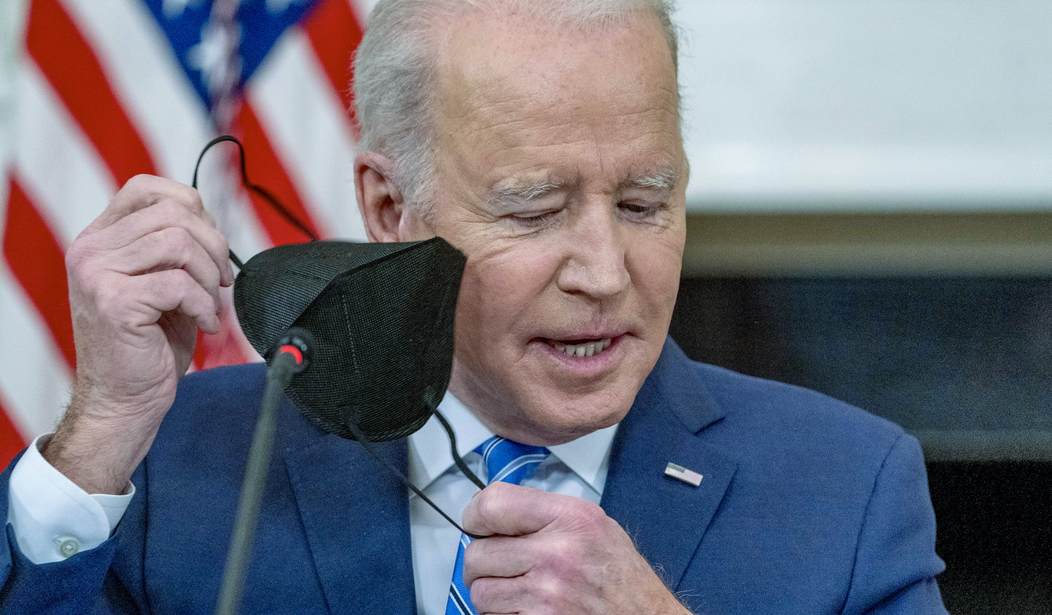Amid the headlines of war in Ukraine, the Centers for Disease Control and Prevention (CDC) quietly announced in late February that it would wind down a myriad federal COVID-19 rules that have dominated American life for two years. With regulations and guidance directing masking, distancing, and vaccination in the rearview, the American people are celebrating a long-awaited return to normality.
Unfortunately for millions of Americans, there are some harmful COVID-19 policies that remain. As the federal government maintains its emergency declaration, seemingly in perpetuity, the Biden administration’s extensions on eligibility for welfare programs have kept far too many working-age, able-bodied adults from the workforce.
Beyond the obvious economic strains from a labor market weakened by an 11 million-worker shortage, prolonged reliance on programs like food stamps, Medicaid, and unemployment insurance (UI) can create genuine personal challenges from which some individuals can never fully recover. From greater substance abuse to dwindling mental health, the social ills associated with getting paid not to work are simply indisputable.
Since the pandemic began, more than 240,000 Americans have died as a result of drug or alcohol use. According to a National Bureau of Economic Research study, at least 11,000 of these overdose deaths are the direct result of receiving UI payments from the federal government. Researchers say that stimulus checks, combined with newfound eligibility for benefits programs, gave people more disposable income to spend on drugs and alcohol.
At the same time, the rate of behavioral health illnesses, like anxiety and depression, has skyrocketed. Research recently published at the National Institutes of Health argues that long-term joblessness has exacerbated existing mental health disorders and, in many Americans, spurred new ones. “Although policy changes have increased health care and unemployment benefits, most people want jobs and self-sufficiency rather than handouts,” they concluded.
Recommended
Indeed, it has long been known that in addition to meeting a worker’s corporal needs, a job provides fulfillment, purpose, and confidence. A 2014 Gallup study found that 12.4 percent of Americans who were unemployed suffered from depression, compared to just 5.6 percent of those who worked full time—and that was long before pandemic-related mental health complications.
“When you have a job, you have a continuous source of feedback that you are a contributing member of society,” psychologists told USA Today, and that helps an individual “feel wanted and that [they’re] contributing to [their] finances.” Jobs also give people a sense of belonging, which can serve as a powerful buffer against depression.
For hundreds of thousands of Americans, systemic joblessness can be deadly. And two years after pandemic shutdowns began, the situation could not be more dire. According to the CDC, 13 percent of Americans reported starting or increasing substance use to deal with the stress of the pandemic. Today, one in five Americans say they’re experiencing mental illness, with more than half not receiving treatment for their condition.
Now, more than ever, public officials must focus their policymaking on restoring these programs to their pre-pandemic parameters. This will catalyze a return to jobs for working-age, able-bodied adults who remain outside of the workforce. This means the federal government must end the provisions that allow states to refuse to enforce qualifications for prospective beneficiaries to receive assistance, like work requirements.
We have already seen the benefit of reducing access to welfare programs. According to the same National Bureau of Economic Research study, fewer overdose deaths occurred when unemployment benefits were scaled back.
And even among states, the results couldn’t be clearer. States that have half-heartedly maintained weak work search requirements are keeping unemployed individuals from returning to the workforce. Michigan, for example, only mandates recipients submit one job application per week to receive benefits for upwards of 20 weeks. It is no surprise, then, that the state’s 5.6 percent unemployment rate is much higher than the national average.
Meanwhile, states that require even modestly more thorough attempts at finding employment see better outcomes. In Arkansas, benefit recipients must make two to three job contacts weekly. Today, the state’s unemployment rate of 3.1 percent is below the national average.
Instead of waiting on the federal government, some states are taking matters into their own hands. In Iowa, lawmakers are considering legislation that would dramatically cut down the length of time unemployment benefits may be collected from the currently allowable six months. Nearby Kansas has already enacted a similar reform, and its unemployment rate is among the lowest in the country.
And as federal officials examine the implications of policy decisions made during the pandemic, they should strongly reconsider issuing checks indiscriminately in the event of a future national emergency. They should also establish new safeguards that would stand in the way of the executive branch unilaterally weakening eligibility requirements whenever they wanted.
This is not merely a fiscal crisis. It is a moral one, too. With so many of our fellow Americans suffering from substance abuse and mental health disorders, our policymakers must avoid fostering conditions that only worsen the challenges they already face.
Instead, they must enact policies that honor the potential of every human being. This begins by making the prospect of employment more appealing than joblessness. With the pandemic winding down, there’s no better—or more urgent—time than now.
Stefani E. Buhajla is the communications director at the Foundation for Government Accountability.
























Join the conversation as a VIP Member